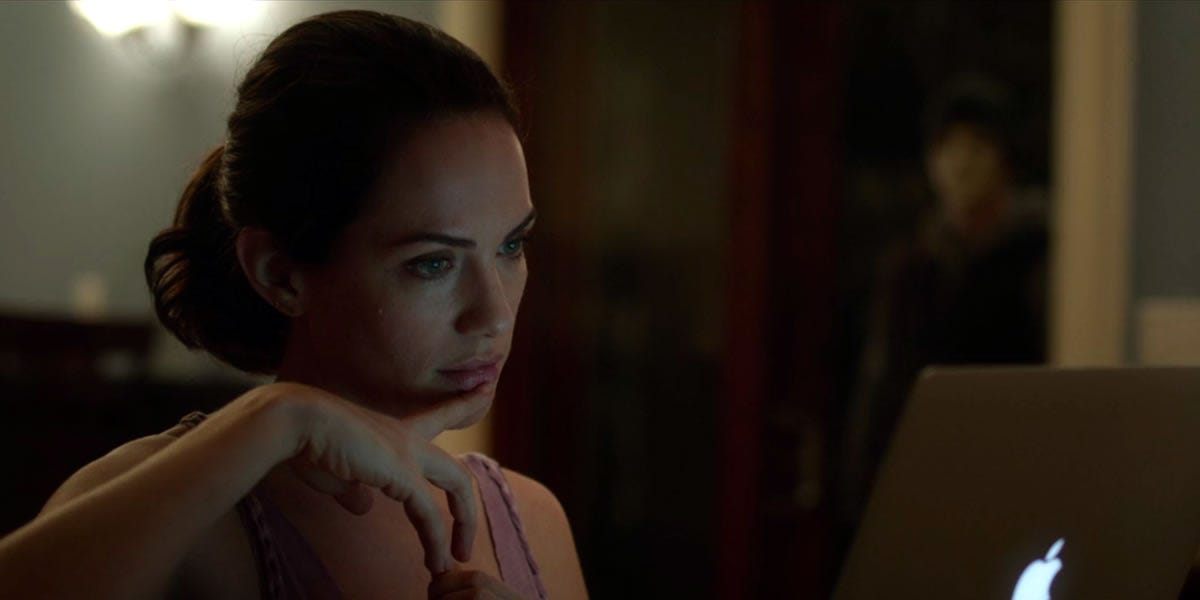
The Trailer:
Director: Mike Flanagan
Writer: Mike Flanagan & Kate Siegel
Cast: Kate Siegel, & John Gallagher Jr.
Plot Summary: Deaf author, Maddie (Kate Siegel), living in the woods to write her new novel must use her quick wit to fight against a masked killer (John Gallagher Jr.)
You know, home intruder/invasion films might be some of my unwitting favorites within the thriller genre. It's rarely a type of film that I ever desire to watch (not like how I desire to watch atmospheric, suspenseful, psychological horrors), but when I do I am always completely fulfilled and entertained. And isn't that all that matters? Anyways, most home intruder films possess a tight-string of suspense that almost always works: there is the question of whether or not the protagonist is going to survive, and not only will they survive but will they have a true prey-becoming-the-predator transformation that us viewers root for, and why did the intruder pick this home? Though, not all questions will be answered, most home-invasion films end with some kind of happy resolution (save for films like The Strangers). Recently, though (I'd say since the early 2000's) there has been and influx of home invasion films, and with that comes overused tropes and clichés. The spark that made them great originally, is now a common, highly used formula that becomes boring, albeit still entertaining. So I was intrigued, as was the entire horror-lovers community, about this film that utilizes the protagonist's deafness as a way to up the ante of Hush, a film that could've otherwise been just another "boring" movie in a stagnant film genre.
First let me talk about the acting, because if the acting had been terrible the movie would've failed completely. Since there are only two characters, each of them have to have a strong credible air about them in order for us to be fully engulfed in their world and I'd say that Kate Siegel and John Gallagher Jr. did a far better job than I could've hoped for. Kate Siegel playing Maddie, an author struggling with writer's block, is amazing. Right off the bat we discover that not only is Maddie smart, but she has a quick wit, and she is capable: if need be, she can handle her own. I instantly knew that she'd be a total badass and be a real threat to the masked killer. John Gallagher Jr. as the masked killer (who I will henceforth refer to as The Man) is just as amazing. There is this aura of controlled instability about The Man that Gallagher so easily portrayed. I was afraid. With his actions we were enlightened to the probable fact that this is not The Man's first time doing this: he is patient, skilled, and without remorse for his actions. Throughout the film, their relationship grows increasingly intimate (not in a romantic way, but personal): both of them are set on survival and become well acquainted with each other's weaknesses as well as their strengths. Chiefly, this is what I appreciate most about Hush: the strange dynamic between prey and predator and how sometimes that line becomes blurred with the threat of death. Amazing acting leads to great characters which leads to a great story.
Now for the actual story. Overall, I love the movie but that doesn't mean it's without it's hiccups. There are a few plot devices used that in the end seem a bit too convenient for my taste. And generally, as with all horror movies, there are a lot of stupid decisions made throughout the film (i.e. Maddie making the MOST FUCKING NOISE during one of her attempted escapes! Like, girl, he can hear you!!!). But all that aside, Hush is a solid thriller that genuinely terrified me. You know, there's always that part in a horror film where the killer/stalker/predator is standing literally right behind its next victim and you're wondering how on earth can this person not hear the killer/stalker/predator walking towards them, breathing, etc.? Well here in Hush the anxiety builds from us knowing that The Man is right behind Maddie, knocking on her window, walking over the gravel outside her home and she as no idea that he's there because she literally cannot hear. You don't know how many times I yelled at the screen "Girl, turn around!! He's right behind you! Satan, how do I sign "there's a fucking killer behind you" in sign language?" I mean her being deaf not only brought a minority character (it's rare for a protagonist in a film to be deaf) to the front and center and give the deaf community their visibility. but it actually worked as a detail in the film to catalyze more scares. I am truly impressed. Also, Maddie is not invincible. Too often in films the protagonist can be shot, stabbed, knocked out, whatever, and will continue on throughout the rest of the movie as though nothing happened, but not in Hush. Maddie gets hurt at one point and the effects of her injury start to weaken her and not only does she recognize this as a problem, but we witness it too: we see how she begins to waver in and out of consciousness, how it is a real struggle to stand/walk/fight, how she just generally loses a bit of the strength that she originally possessed. I was genuinely scared for her.
If there's one home invasion film that you should see, it's Hush. I was entertained and completely enjoyed it through and through. It's different and fresh and creative. It features a badass protagonist and a creepy, but strong antagonist. What more could you want from a thriller? Watch it, watch it NOW!!! Would I watch it again? Most definitely!

